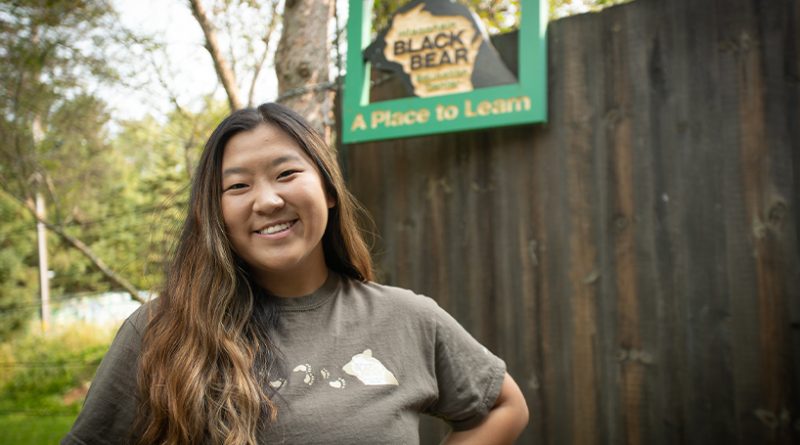Internship provides wildlife ecology major insights into black bears
For the Metro Wire
Kaylee Woelfel has been faithfully practicing social distancing this summer. However, her efforts are not related to the coronavirus pandemic. Positioned safely behind an eight-foot electric fence, the wildlife ecology major has been studying the dietary and behavior habits of four adult black bears as part of a summer internship. Wisconsin is home to an estimated 24,000 black bears.
Working 20 to 40 hours a week, the University of Wisconsin-Stevens Point junior and wildlife ecology major from Plymouth, Wis., has been observing the animals through the summer at the Wisconsin Black Bear Education Center, a not-for-profit private sanctuary east of Wausau in the Town of Wausau.
The bears, ranging from 350 to 600 pounds, roam freely throughout the six-acre property, allowing them to live normal lives and provide close observation for learning. The habitat includes a waterfall and pond, natural vegetation for foraging, open meadows, and numerous hibernation dens.
Access to the bears is limited so Woelfel has had to be patient while doing her research.
“I don’t get extremely close to them. Sometimes they come within a few feet of me but usually, they hide and sleep where I can’t see them, especially in thick vegetation,” she said.
“Bears are secretive, so using captive ones so we can be close to them is important,” said Shelli Dubay, UW-Stevens Point wildlife ecology professor, and Woelfel’s project adviser. “Kaylee can see how the bears interact with each other when they are in captivity. Those interactions would be difficult to capture in a wild setting.”
Woelfel also photographs the bears and chronicles their behaviors and diets in a journal she is compiling. “Interestingly, they are picky eaters. Now they are eating buckthorn and jewelweed,” she said. “When not foraging, they generally sleep. When the weather is humid and hot, they sleep in the shade or relax in the pond.”
The bears also display other interesting behaviors. “They do an army crawl to stay cooler and conserve energy when looking for seeds or nuts,” said Woelfel, one of approximately 100 students enrolled in the captive wildlife minor at UW-Stevens Point.
“Sometimes they purposely walk through and on top of shrubs or other vegetation to mark their scent. They also exhibit many interesting vocal behaviors,” she said.
Jeff Traska, a construction contractor, founded the center 20 years ago.
“There’s a lot of watching and waiting. It’s not hands-on learning,” said Traska, who welcomes visitors to the sanctuary by appointment only. “Kindergartners, nursing home residents, and people from all parts of the world have been here.”
Woelfel shares what she learns with center visitors. “I have participated in many group tours. I don’t go into too much detail but give them the basics of what I observe and explain the goals of my research,” she said.
“Kaylee is learning how to take behavioral data and share it with the public,” added Dubay. “She is sharing her observations on social media to increase the center’s profile throughout the world.”
“I went into this experience not really understanding much about bears,” Woelfel said. Her internship helped her realize that people harbor many misconceptions about them. “The media portray them as these mean, aggressive animals, but really they aren’t, especially black bears,” she said. “They’re only aggressive if they become food-oriented or if they’re with their cubs. Otherwise, they want to keep their distance from humans.”
Woelfel discovered her purpose as a sophomore in high school when visiting her older brother, then a marine biology student studying abroad in Australia. “I have always loved animals, but when we went to a wildlife sanctuary that’s when it hit me that this is something I may want to do as a career.
“I love the idea of being able to rescue abandoned or injured animals and bringing them back to full health, releasing them back into their natural habitat and giving them that second chance at life,” said Woelfel. She would like to work in an animal sanctuary or rehabilitation facility after earning her bachelor’s degree.

